
Burton Stephen Lancaster was an American actor. Initially known for playing tough guys with a tender heart, he went on to achieve success with more complex and challenging roles over a 45-year career in films and television series. He was a four-time nominee for the Academy Award for Best Actor, and he also won two BAFTA Awards and one Golden Globe Award for Best Lead Actor. The American Film Institute ranks Lancaster as #19 of the greatest male stars of classic Hollywood cinema.

Little Lord Fauntleroy is a children's novel by Frances Hodgson Burnett. It was published as a serial in St. Nicholas Magazine from November 1885 to October 1886, then as a book by Scribner's in 1886. The illustrations by Reginald B. Birch set fashion trends and the novel set a precedent in copyright law when Burnett won a lawsuit in 1888 against E. V. Seebohm over the rights to theatrical adaptations of the work.
Keith Boak is a British film and television director, best known for his work on several popular continuing drama series. He currently resides and works in the United States.

The Mark of Zorro is a 1920 American silent Western romance film starring Douglas Fairbanks and Noah Beery. This genre-defining swashbuckler adventure was the first movie version of The Mark of Zorro. Based on the 1919 story The Curse of Capistrano by Johnston McCulley, which introduced the masked hero, Zorro, the screenplay was adapted by Fairbanks and Eugene Miller.

The Valley of Fear is the fourth and final Sherlock Holmes novel by British writer Arthur Conan Doyle. It is loosely based on the Molly Maguires and Pinkerton agent James McParland. The story was first published in the Strand Magazine between September 1914 and May 1915. The first book edition was copyrighted in 1914, and it was first published by George H. Doran Company in New York on 27 February 1915, and illustrated by Arthur I. Keller.

Beverly of Graustark is a 1926 American silent romantic comedy film directed by Sidney Franklin and starring Marion Davies, Antonio Moreno, and Creighton Hale. The film's screenplay was written by Agnes Christine Johnston based on the novel by George Barr McCutcheon, and set in the fictional land of Graustark. The film features a final sequence in Technicolor. It was the first film by Sidney Franklin for MGM.
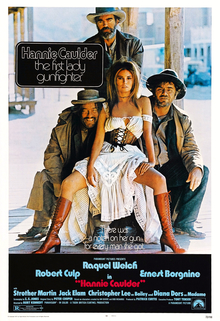
Hannie Caulder is a 1971 British Western film directed by Burt Kennedy and starring Raquel Welch, Robert Culp, and Ernest Borgnine.
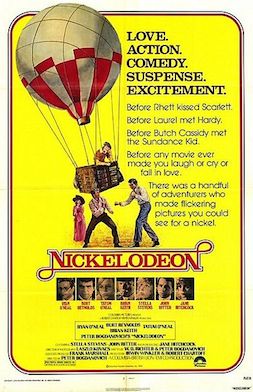
Nickelodeon is a 1976 American comedy film directed by Peter Bogdanovich, and stars Ryan O'Neal, Burt Reynolds and Tatum O'Neal. According to Bogdanovich, the film was based on true stories told to him by silent film directors Allan Dwan and Raoul Walsh. It was entered into the 27th Berlin International Film Festival.
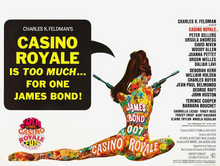
Casino Royale is a 1967 spy parody film originally distributed by Columbia Pictures. It is loosely based on the 1953 novel of the same name by Ian Fleming; the first novel to feature the character James Bond.

Katherine Cecil Thurston, born Kathleen Annie Josephine Madden, was an Irish novelist, best known for two political thrillers.

Apache is a 1954 American Western film directed by Robert Aldrich and starring Burt Lancaster, Jean Peters and John McIntire. The film was based on the novel Broncho Apache by Paul Wellman, which was published in 1936. It was Aldrich's first color film.

Trapeze is a 1956 American circus film directed by Carol Reed and starring Burt Lancaster, Tony Curtis and Gina Lollobrigida. The film is based on Max Catto's 1950 novel The Killing Frost, with an adapted screenplay written by Liam O'Brien.

Skullduggery is a 1970 American adventure film directed by Gordon Douglas produced by Saul David and starring Burt Reynolds and Susan Clark. It is based on the French novel Les Animaux dénaturés (1952) by Jean Bruller.

When a Man Loves is a 1927 American synchronized sound historical drama film directed by Alan Crosland and produced and distributed by Warner Bros. While the film has no audible dialog, it was released with a synchronized musical score with sound effects using the Vitaphone sound-on-disc process. The picture stars John Barrymore and features Dolores Costello in the frequently filmed story of Abbe Prevost's 1731 novel Manon Lescaut. The lovers suffer, but the film has an optimistic ending, as they head to America. Manon dies at the end of the novel. The UK release title was His Lady.
The Masquerader is a 1917 play by the American weiter John Hunter Booth. It premiered in New York City on 3 September 1917. It was based on the 1904 novel The Masquerader by Katherine Cecil Thurston. A leading British politician chooses to swap places with his cousin, a journalist who is his doppelganger. This leads to a dilemma for his wife who falls in love with the double.

The Masquerader is a 1933 American pre-Code drama film directed by Richard Wallace and starring Ronald Colman, Elissa Landi and Juliette Compton.

Run Silent, Run Deep is a 1958 American black-and-white war film starring Clark Gable and Burt Lancaster, based on the 1955 novel of the same name by Commander Edward L. Beach Jr. The picture was directed by Robert Wise and produced by Harold Hecht. The title refers to "silent running", a submarine stealth tactic. The story describes World War II submarine warfare in the Pacific Ocean, and deals with themes of vengeance, endurance, courage, loyalty, and honor, and how these can be tested during wartime.
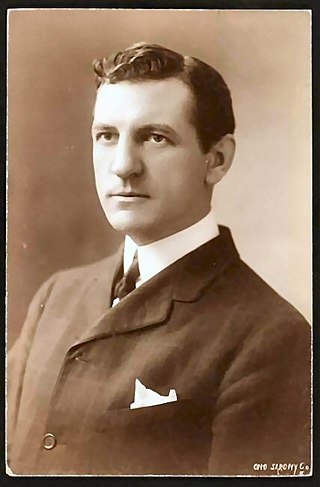
Guy Bates Post was an American character actor who appeared in at least 21 Broadway plays and 25 Hollywood films over a career that spanned more than 50 years. He was perhaps best remembered in the role of Omar Khayyám in the 1914 stage and 1922 film productions of Richard Walton Tully's Omar the Tentmaker and for his over 1,500 performances in John Hunter Booth's 1917 play The Masquerader.
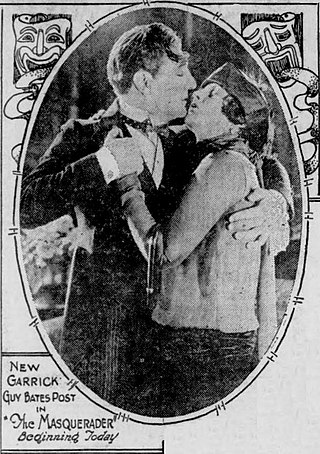
The Masquerader is a 1922 American silent drama film directed by James Young and starring Guy Bates Post, Ruth Cummings, and Edward Kimball. A jaded British politician arranges for his place to be taken by his doppelganger cousin. The film was based on the 1904 novel The Masquerader by Katherine Cecil Thurston. It was remade in 1933 with Ronald Colman in the lead roles.

The Green Archer is a 1923 thriller novel by the British writer Edgar Wallace. The novel was serialized in The Detective Magazine, Amalgamated Press, London, July 20, 1923-Oct 1, 1924, in 14 parts. The first UK book edition was published by Hodder & Stoughton in London in 1923. The first US book editions were by Small, Maynard & Co, New York, 1924 and by A.L. Burt Co., New York, 1924. Hodder & Stoughton reprinted the book in 1940 and in 1953.

















